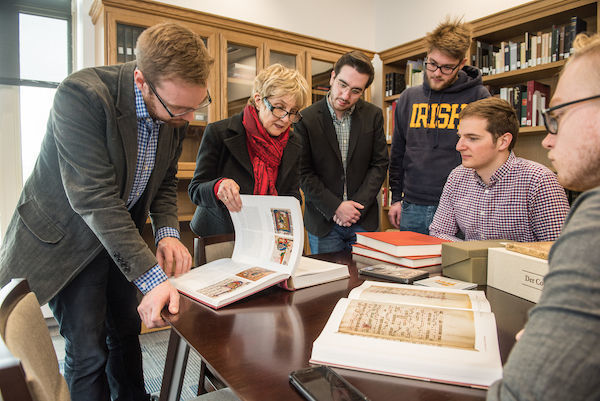Curriculum
The Master of Sacred Music (MSM) degree is a two-year program, with the possibility for summer study. Students must complete a minimum of 48 credit hours, although many students take more credits. To be full-time students and eligible for our stipend and tuition assistantships, students must take a minimum of 9 hours in any given semester. The expectation is that every graduate will be a well-rounded church musician, possessing the requisite skills in playing, conducting, and singing necessary to shape and to lead music programs in the churches of most Christian denominations. Over half of our students seek employment in churches, schools, and performance organizations upon graduation; and about half go on for the DMA or Ph.D.
The 60-hour curriculum of the Calvin M. Bower Doctor of Music Arts Program (DMA) program has four major components: 1) coursework; 2) recitals; 3) thesis; and 4) internship.

MSM Academic Course Requirements
All MSM Students take courses in:
History, Theory & Analysis, Composition
Example Courses
- Music of J.S. Bach
- Masses of Haydn
- Oratorios
- Middlebrow Modernism: the Music of Britten and Messiaen
- Music of Hildegard von Bingen
- Hymnology
- Gregorian Chant and Roman Rite
- World Cultures of Sacred Music
- Creative Composition
- 16th Century Counterpoint and Composition
- Passions, Cantatas, and Requiems
Liturgy & Ritual Studies
Example Courses
- Liturgical Year
- Liturgical History
- Medieval Liturgies
- Sacred Music in the USA
- Eucharist
- Sacred Music in Christian Thought
- Ritual Studies
Primary Lessons: Voice, Organ, Choral Conducting
Four semesters in your field
Musicianship Courses
Example Courses
- Choral, Organ, and Vocal Literature I & II
- Diction
- Improvisation
- Secondary Lessons (Piano, Conducting, Organ)
- Children's Choral Methods & Repertory
- SMND Ensembles (Repertory & Concordia Choir)
Degree Recitals
- First Year Recital
- Second Year Recital
Non-Credit Degree Requirements
- Assistantships - Visit our Assistantship and Funding page for more information.
- Colloquia
- Masterclasses
All DMA Students Take:
Course Requirements
Performance Specialization
- Semesterly studio lessons and masterclasses (six semesters)
- Ensembles and Studio Classes (six semesters)
- Three capstone recitals, one each year, the last of which is a lecture/recital related to the thesis
Academic Courses
All DMA students take SMND-approved academic courses for the first four semesters in residence. Example courses include:
- Music of J.S. Bach
- Masses of Haydn
- Oratorios
- Middlebrow Modernism: The Music of Britten and Messiaen
- Music of Hildegard von Bingen
- Passions, Cantatas, and Requiems
- Hymnology
- Gregorian Chant and Roman Rite
- World Cultures of Sacred Music
- Creative Composition
- 16th Century Counterpoint and Composition
- Sacred Music in Christian Thought
- Worship and Music in the USA
- Music in the Medieval West
- Schenkerian Analysis
- Medieval Liturgies
Required Organ and Choral Literature Courses
Thesis
- Thesis seminar; emphasis on thesis proposal creation and candidate exam preparation (second semester of the second year)
- Research and Dissertation variable credits (third year)
Assistantship
One of the great strengths of the DMA program at Notre Dame is the internships. Each student works in a local church as an organist, choir director, or both. Additionally, DMA students also have the opportunity to serve as directors of the Notre Dame Children’s Choir, teachers in our Organ Training Program, and as a conducting fellow of the South Bend Symphony Orchestra. Visit our Assistantship and Funding page for more information.
Courses Specific to Conducting, Organ, and Voice Disciplines
MSM & DMA — Conducting
- Primary Lessons: Conducting Gesture, Rehearsal Techniques & Recital Preparation
- Choral Literature (Renaissance, Baroque, Classical/Romantic, 20th and 21st Century music)
- Repertory Choir, laboratory ensemble for conducting and rehearsal technique
- Concordia Choir, semi-professional ensemble used for choral conducting recitals
- Children’s Choral Methods — required for all working with the Notre Dame Children’s Choir
- Two recitals, one a cappella, one with small instrumental ensemble
MSM & DMA — Organ
- Primary Organ Lessons
- Organ Literature I (music prior to 1750) & II (music post 1750)
- Two recitals on either the Paul Fritts organ in Reyes Hall of the DeBartolo Performing Arts Center (North German Baroque instrument) or the Murdy Family Organ in the Basilica of the Sacred Heart (add links to these instruments).
- Four Courses in Service Playing and Improvisation
- Concordia Choir, semi-professional ensemble used for choral conducting recitals
MSM — Voice
- Primary Voice Lessons, Coaching Sessions, and Performance Studio Class
- Vocal Performance Practice & Literature I (Early) & II (Modern)
- Voice Science & Vocal Pedagogy
- Opera in Performance
- Lyric Diction Courses
- Concordia Choir, semi-professional ensemble used for choral conducting recitals